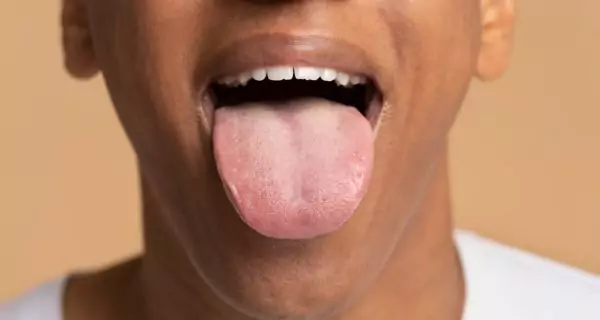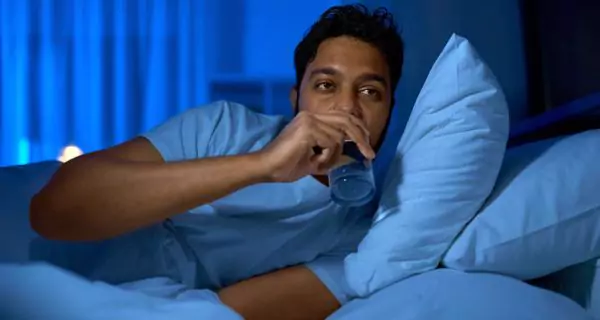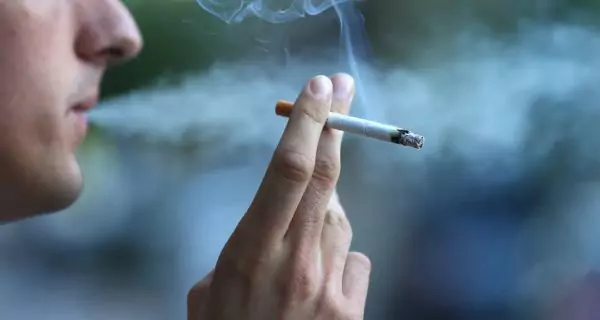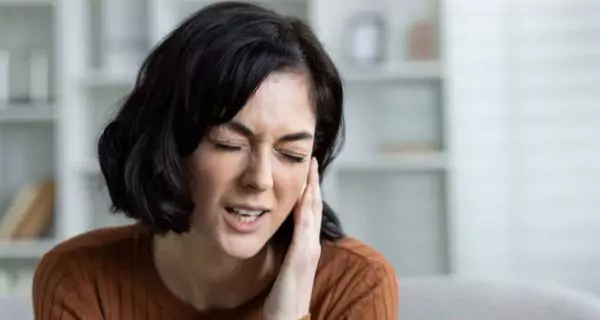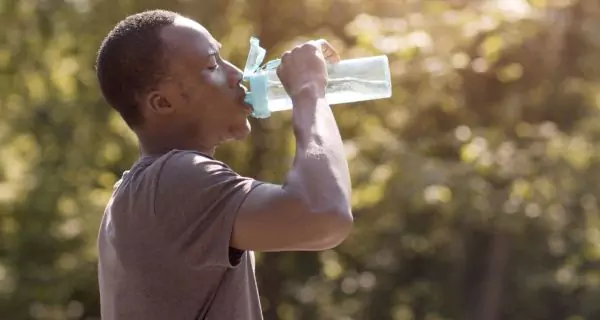Last Updated on: 3rd January 2026, 09:21 am
Waking up with a dry mouth is something that most of us have experienced at some point in our lives, and to some extent, it may be considered normal. This is because saliva production naturally decreases during the night.
However, when that dry sensation becomes frequent—you find yourself waking up every night with a dry mouth and an urgent need to drink water—it’s a sign that something isn’t quite right. This condition doesn’t just interrupt your sleep; it can also leave you with an uncomfortable feeling that lingers throughout the day. This issue is known as nocturnal xerostomia or, more commonly, dry mouth at night.
While it might seem like a minor inconvenience, nighttime dry mouth is more than just a nuisance; it can affect your sleep quality, your breath, and your overall oral health. So, why does it happen? And more importantly, what can you do to prevent it?
What is dry mouth?
Dry mouth happens when the salivary glands don’t produce enough saliva to keep your mouth moist. You might still produce some saliva, but not enough to do its job properly. It’s not a condition that usually appears on its own; it often has an underlying cause, like dehydration, certain medications, autoimmune diseases, or treatments like chemotherapy.
How much saliva do we normally produce?
A healthy person typically produces about 0.3 to 0.4 milliliters of saliva per minute, which adds up to around 500 milliliters per day. In people with dry mouth, this flow can drop to just 0.1 milliliters per minute, reducing saliva’s ability to protect the mouth from bacteria, acid, and food particles.
The role of saliva while we sleep
Saliva does much more than just keep our mouths moist. Saliva helps to:
- prevent tooth decay by washing away food and neutralizing acid
- protect against gum disease (like gingivitis or periodontitis)
- reduce the risk of oral infections, such as thrush
- keep your breath fresh
- make it easier to eat, speak, and wear dentures
Without enough saliva, your mouth becomes dry, vulnerable, and uncomfortable.
At night, it’s normal for saliva production to slow down. But in some people, this decrease is more dramatic, leading to a dry, sticky feeling in the mouth that can interrupt sleep and cause discomfort the next day.
What does dry mouth at night feel like?
Dry mouth at night is more than just a dry throat or feeling thirsty. It can cause a variety of uncomfortable symptoms, like:
- a dry, sticky, or rough feeling in the mouth
- thick or stringy saliva
- cracked lips or a dry, sore tongue
- bad breath, especially in the morning
- Aa scratchy or itchy throat
- change in taste
- waking up frequently to drink water, or because breathing through your mouth feels uncomfortable
If you wear dentures, you might also feel increased discomfort or irritation during the night.
How dry mouth affects your sleep
The impact of dry mouth goes beyond the physical discomfort. Constant dryness, difficulty breathing while sleeping, or the need to sip water throughout the night can break your sleep cycle and prevent you from getting truly restful sleep.
Over time, this can lead to:
- daytime fatigue
- irritability
- trouble concentrating
- in some cases, even worsening of dry mouth symptoms due to poor overall health
It becomes a cycle: poor sleep affects your health, which, in turn, can increase your risk of chronic dry mouth.
Daytime symptoms you might notice
Even though dry mouth may start at night, its effects often carry into your day. You might experience:
- trouble chewing, swallowing, or speaking comfortably
- a lingering bad or altered taste in your mouth
- a hoarse or dry voice
- mouth sores or a burning sensation
- discomfort while wearing dentures
- persistent bad breath that doesn’t go away with brushing
Causes of dry mouth at night
Understanding what’s behind your dry mouth at night is the first step toward finding the right solution. This condition can be caused by several factors, ranging from simple habits to more serious health conditions.
1. Dehydration
This is one of the most common and overlooked causes of dry mouth. When your body doesn’t have enough fluids, it reduces saliva production to conserve water. You might not feel extremely thirsty, but even mild dehydration, especially after hours of sleep without drinking, can dry out your mouth.
What contributes to dehydration?
- not drinking enough water throughout the day
- excessive sweating, fever, vomiting, or diarrhea
- eating salty foods or drinking caffeine and alcohol, which act as diuretics
- certain health conditions or medications
2. Mouth breathing and snoring
Breathing through your mouth instead of your nose during sleep exposes the soft tissues in the mouth to dry air, which quickly evaporates saliva. This is especially common if you:
- have nasal congestion (from allergies, colds, or sinus issues)
- have a deviated septum or enlarged nasal tissues
- suffer from sleep apnea or snore regularly
Mouth breathing not only worsens dry mouth, but it can also disturb your sleep and leave you feeling tired in the morning.
3. Medications
Many prescription and over-the-counter medications list dry mouth as a side effect. These drugs may reduce saliva production or dry out the tissues in the mouth.
Common culprits include:
- antihistamines (for allergies or colds)
- antidepressants and antipsychotics
- diuretics and blood pressure medications
- muscle relaxants, pain relievers, and decongestants
If you notice dry mouth after starting a new medication, talk to your doctor. There might be alternatives or ways to manage the side effects.
4. Medical conditions
Certain health issues can directly affect your salivary glands or reduce their ability to function properly.
Some of the most common include:
- Diabetes: High blood sugar can cause dehydration and damage salivary glands
- Sjögren’s syndrome: an autoimmune disorder that attacks the glands that produce saliva and tears
- Rheumatoid arthritis, thyroid disorders, anemia, and Parkinson’s disease
- Obstructive sleep apnea, stroke, Alzheimer’s, and HIV/AIDS may also contribute to dry mouth, either directly or due to associated medications
- Diabetes: High blood sugar can cause dehydration and damage salivary glands
5. Cancer treatment
Cancer therapies, especially those targeting the head and neck, can impact saliva production:
- Radiation therapy may damage salivary glands or the nerves that control them
- Chemotherapy drugs can alter saliva consistency or reduce its flow
These effects can sometimes be long-lasting, depending on the treatment.
6. Lifestyle factors and habits
Your daily habits can also play a big role in nighttime dry mouth. These include:
- Smoking or chewing tobacco: Tobacco products reduce saliva flow and irritate the mouth
- Alcohol consumption: Alcohol is dehydrating and can dry out oral tissues
- Caffeine intake: Caffeine acts as a diuretic, increasing fluid loss
- Stress and anxiety: can reduce saliva production, especially during sleep
- Poor indoor air quality: Using fans, heaters, or sleeping in a dry environment without a humidifier can worsen symptoms
7. Hormonal and age-related changes
As we age, saliva production may naturally decrease due to changes in the body and the increased likelihood of taking multiple medications. Older adults are more likely to experience chronic dry mouth, even without underlying health issues.
Hormonal changes in pregnancy, breastfeeding, or menopause can also affect how much saliva your body produces, sometimes leading to dry mouth during sleep.
When to talk to a doctor about dry mouth at night
Occasional dryness in the mouth at night isn’t usually a cause for concern. But if it becomes persistent, lasts for several weeks, or continues despite trying home remedies, it’s time to check in with a healthcare provider.
Chronic dry mouth can increase your risk of:
- tooth decay and cavities
- gum disease
- oral infections like thrush
- difficulty chewing, swallowing, or speaking
You should also seek medical attention if you experience:
- mouth pain, burning, or inflammation
- swollen salivary glands
- frequent mouth sores or infections
- discomfort that affects your sleep, digestion, or quality of life
A doctor or dentist can help identify the root cause and recommend the most effective treatment, including saliva substitutes, prescription options, or lifestyle adjustments.
How to treat and prevent dry mouth at night
There are many effective ways to relieve and prevent dry mouth at night. From small lifestyle changes to medical treatments, here are some strategies that can help you sleep more comfortably and protect your oral health.
Medical treatments for dry mouth at night
If your dry mouth is persistent or affecting your quality of life, your doctor or dentist may recommend one or more of the following:
- Saliva substitutes: over-the-counter sprays, gels, and mouthwashes that mimic natural saliva and help keep your mouth moist, especially before bedtime.
- Prescription medications: Drugs like pilocarpine or cevimeline can help stimulate saliva production. They are typically prescribed for more severe cases and should be used under medical supervision due to possible side effects like sweating or digestive upset.
- Treatment of underlying conditions: If your dry mouth is linked to another health issue (such as diabetes, Sjögren’s syndrome, or sleep apnea), treating the particular condition may reduce your symptoms.
Home remedies for dry mouth at night
Many people find relief with simple, natural strategies that can be done at home:
- Stay hydrated: Sip water throughout the day. Don’t wait until bedtime to drink; staying consistently hydrated helps prevent dryness overnight.
- Chew sugar-free gum or suck on sugar-free lozenges: These stimulate saliva production; it is better if they contain xylitol, which also fights bacteria.
- Try coconut oil pulling: Swishing coconut oil in your mouth before bed may create a protective barrier and help lock in moisture.
- Drink herbal teas: Warm, non-caffeinated teas like chamomile, ginger, or peppermint may soothe the throat and lightly stimulate saliva flow.
- Use a bedside humidifier: Moist air helps reduce the drying effect of nighttime breathing, especially if you’re a mouth breather.
- Keep water by your bed: This way, if you wake up feeling dry, you don’t need to fully get up to rehydrate.
Easy prevention tips to add to your routine
Prevention is key, especially if you only experience mild or occasional dry mouth. Try these daily habits to help reduce the chances of waking up with that uncomfortable dryness:
- Maintain hydration throughout the day: Aim for at least 8 glasses of water per day (more if you’re active or in a hot climate). Sip slowly and consistently, especially in the evening hours.
- Avoid dehydrating substances: Cut back on caffeine and alcohol, especially in the afternoon. They both act as diuretics, meaning they pull water from your body and contribute to dryness.
- Practice nasal breathing: If you breathe through your mouth while sleeping, work on correcting it. Saline sprays, nasal strips, or consulting an ENT specialist should help you breathe through your nose and reduce mouth dryness.
- Adjust your sleeping position: Sleeping on your back or side with proper pillow support can help keep your mouth closed during sleep, reducing dryness caused by mouth breathing.
- Upgrade your oral care routine
- Use a fluoride toothpaste and alcohol-free mouthwash. (Some are specially designed for dry mouth).
- Brush and floss before bed to reduce bacteria that thrive in a dry environment.
- Some mouth rinses contain ingredients that not only hydrate but also protect your teeth overnight.
Don’t forget that dry mouth isn’t just uncomfortable; it can also lead to tooth decay, gum disease, and bad breath if left unmanaged. Regular dental checkups (at least twice a year) are important, especially if you’re prone to dry mouth. Your dentist may recommend custom strategies based on your unique needs.
Conclusion
Dry mouth at night is more than just a minor inconvenience—it’s an issue that can affect your sleep, your well-being, and your oral health. While the causes can vary, there are many ways to relieve and prevent it.
Staying well-hydrated, taking care of your oral hygiene, making small adjustments to your routine, and seeking professional help when needed can make a big difference.
Don’t accept waking up with a dry mouth as something normal. There are simple solutions that should help you sleep better and take care of your smile.
Frequently Asked Questions
How long does it take to improve dry mouth at night?
Can dry mouth at night go away on its own?
What is the connection between dry mouth and bad taste in the mouth?
Are certain sleep positions better for preventing dry mouth?
Is it safe to sleep with sugar-free candy or gum in my mouth?
Share
References
1. Cleveland Clinic Staff. (2023, 15 September).Dry mouth (Xerostomia). Cleveland Clinic. https://my.clevelandclinic.org/health/diseases/10902-dry-mouth-xerostomia
2.Herndon, J. (2023, 3 April). Why Do I Get Dry Mouth at Night? Healthline. https://www.healthline.com/health/dry-mouth-at-night
3. Newman, T. (2023, 19 December). Everything you need to know about dry mouth. https://www.medicalnewstoday.com/articles/187640
4. Ngo, D. Y. J., N., & Thomson, W. M. (2015). Dry mouth – An overview. Singapore Dental Journal, 36, 12-17. https://doi.org/10.1016/j.sdj.2014.12.001
5. NHS. (2023, 29 November). Dry mouth. nhs.uk. https://www.nhs.uk/conditions/dry-mouth/
6. WebMD contributors. (2024, 18 November). Dry Mouth and Dental Health. WebMD. https://www.webmd.com/oral-health/dental-health-dry-mouth
-
Dr. Yeidy Carolina Mesa [Author]
DDS Yeidy Carolina Mesa Passionate Dentist | Advocate for Accessible Oral Health Education Graduating from Universidad CES in 2022, I am a dedicated general dentist with a lifelong passion for helping others and making a meaningful impact in the world. My journey into dentistry began at the age of 7, inspired by my own experience with braces and overcoming a fear of the dentist. This personal journey shaped my mission to help patients conquer their own dental anxieties and embrace a healthier,...
View all posts
-
Nayibe Cubillos M. [Medical Reviewer]
Pharmaceutical Chemestry |Pharmaceutical Process Management | Pharmaceutical Care | Pharmaceutical Services Audit | Pharmaceutical Services Process Consulting | Content Project Manager | SEO Knowledge | Content Writer | Leadership | Scrum Master
View all posts
A healthcare writer with a solid background in pharmaceutical chemistry and a thorough understanding of Colombian regulatory processes and comprehensive sector management, she has significant experience coordinating and leading multidisciplina...



